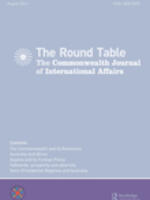Filter by...
Reset all
Publications (16)
Journal Article
– The pitfalls of education reform during post-war institutional transformation in Burundi
In this study, we investigate the relationship between education reform, institutional legacies of inequality, and changing political institutions in a poor, conflict-affected country. Burundi experienced a dramatic change in ethnic and regional power relations after the 1993–2005 civil war. The...
Report
pdf
This study is part of a series of ten country-focused desk studies on aid and democracy prepared under the project The state and statebuilding in the Global South. They are prepared under the guidance of Rachel M. Gisselquist as background to a broader research effort on aid, governance, and...
Working Paper
pdf
– A controlled comparison of Rwanda and Burundi
I examine whether and how the means through which a civil war ends affects the success of a country’s state-building strategy after conflict. I show that two distinct modes of conflict termination—military victories and negotiated settlements—lead to differential long-run state-building outcomes and...
Working Paper
pdf
In this study, we investigate the relationship between education reform, institutional legacies of inequality, and changing political institutions in a poor, conflict-affected country. Burundi experienced a dramatic change in ethnic power relations after the 1993–2005 civil war. The post-war...
Working Paper
pdf
– Comparing views from Rwandan and Burundian citizens
The lack of political representation often lies at the origin of identity-based violence, and, when not resolved, can re-ignite violence. We study who perceives gains and losses in political representation in Rwanda and Burundi and why. We rely on a quantitative and qualitative analysis of over 700...
Working Paper
pdf
How does conflict, displacement, and return shape trust, reconciliation, and community engagement? And what is the relative impact of exposure to violence on these indicators? In this paper we explore these questions by focusing on the legacies of armed conflict and the differences between those who...
Working Paper
pdf
– A comparative analysis of Burundi and Rwanda
We study the impact of electoral gender quotas in post-war Burundi and Rwanda on women’s political representation. First, we look at descriptive representation by studying the number of female representatives and the prestige of their positions in the legislative and executive branches of government...
Journal Article
This peer-reviewed research is available free of charge. UNU-WIDER believes that research is a global public good and supports Open Access.
Part of Journal Special Issue
Aid to Support Fragile States
Working Paper
pdf
Rwanda and Burundi have both emerged from civil wars over the past 20 years and foreign donors have provided significant contributions to post-conflict reconstruction and development in the two countries. Yet although Rwanda and Burundi share several important characteristics, the social, political...
Working Paper
pdf
– Portfolio Choice and Violence in Civil War in Rural Burundi
This paper challenges the idea that farmers revert to subsistence farming when confronted with violence from civil war. Macro-economic evidence on economic legacies of civil war suggests that civil wars, while obviously disastrous in the short run, do not need to have persistent effects on long term...
Journal Article
Part of Journal Special Issue
Conflict and Peace-building

– Interactions between Politics and Economics
Reconstruction from conflict is a complex and demanding task, and a major challenge for the UN system as well as the wider donor community. National authorities and their donor partners are faced with multiple priorities - rebuilding infrastructure, assisting war-damaged communities, and re-creating...
Working Paper
pdf
This paper examines the causes of conflict in Burundi and discusses strategies for building peace. The analysis of the complex relationships between distribution and group dynamics reveals that these relationships are reciprocal, implying that distribution and group dynamics are endogenous. The...
Book Chapter
From the book:
Fiscal Policy for Development
Working Paper
pdf
The ethnic conflicts in Burundi and Rwanda have severely weakened the economies and worsened the structural fiscal imbalances of these countries. Government revenue has declined due to the erosion of the tax base and tax administration capacity. At the same time, governments have shifted the...
Book Chapter
– The Long Sombre Shadow of Ethnic Instability
From the book:
War, Hunger, and Displacement
Displaying 16 of 16 results
 Join the network
Join the network